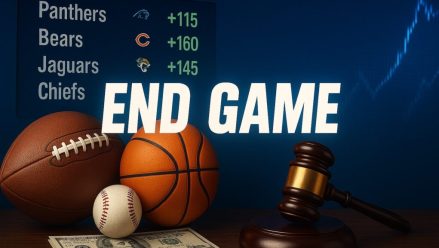There was already no doubt that the ongoing conflict between the state-regulated sports betting industry and nascent prediction-market-as-sportsbook movement is existential.
If prediction markets, led in court and the marketplace by Kalshi, prevail in being allowed to offer ersatz sports bets in every United States jurisdiction without state regulation, actual sportsbooks spending millions on operator fees and ever-increasing taxes payments could follow. That’s bad news for states ever-leaning on these taxes to fill budget holes.
Last week at the National Council of Legislators from Gaming States (NCLGS) Summer Meeting, it became obvious that the fight was also an ideological one that Kalshi attorney Josh Sterling relishes.
Sterling, a partner at the Milbank law firm and former Commodity Futures Trading Commission (CFTC) counsel, came across as a mix of the stripe of libertarian capable of making Rand Paul seem uncommitted to the cause, a heartless bastard, and an eager and ferocious advocate for Kalshi in its multi-front legal campaign.
In 61 minutes of jousting with a competitor with some shared world view (Sporttrade CEO Alex Kane), an industry observer (Prediction News Prediction Market Industry Analyst Chris Gerlacher), and a foe (Yuhaaviatam of San Manuel Nation Associate General Counsel Mike Hoenig), Sterling demonstrated a taste for the fight, living in the gray areas his adversaries believe repudiate the case of his client, Kalshi CEO Tarek Mansour. Sterling, however sees them as black and white, and in his favor.
Sterling raked through minutiae with Hoenig, decried taxation in general, and at one point asserted every human’s right to ruin themselves, declaring: “People are adults, and they’re allowed to spend their money however they want, and if they lose their shirt, that’s on them. I mean, that would be obvious, right?”
Not to Massachusetts Gaming Commission Chairman Jordan Maynard, who in a later NCLGS panel exasperatedly retorted: “I heard someone on a panel the other day say, ‘If someone loses their shirt, who cares?’ We f***ing care.”
Here’s a look at some of the more noteworthy discussions and debates between Sterling and the other panelists.
Point-counterpoint
In response to moderator and NCLGS President Shawn Fluharty, on where the line is drawn on what constitutes legal, CFTC-regulated fodder for prediction markets:
Sterling: “The line is drawn in Section 2A, 1A of Title VII of the United States Code. It basically says any contract is a swap or a futures contract or an option. It’s traded on a CFTC-licensed marketplace.
“It’s subject to the exclusive jurisdiction of the CFTC. What that would mean is there could be trading with similar instruments, not on an exchange, which could be subject to state jurisdiction. And, in fact, Section 16E2B of the same set of statutes would precisely allow exactly for that.
“So things like state bucket shop laws and other things can apply to off-exchange trading. So I think that’s your line.”
In response to Gerlacher asserting that courts must rule whether sports prediction markets have enough economic impact to be declared swaps:
Sterling: “I actually don’t think that that’s correct. I don’t think that the courts decide any of that. There is no economic line-drawing around these contracts at all. It’s not for courts to substitute their judgment about what is speculation or what’s hedging or what’s too much speculation. It’s a nation of laws.
“It’s not ‘stick your finger in the air and see which way the wind’s blowing.’ And what the law basically says is that if there’s any kind of policy-weighing of the public utility and the public good of these contracts, it’s up to the CFTC to handle. So the courts don’t get to decide that.
“I think the courts agree with us so far. So it’s not Goldilocks. The law is clear.”
Responding to a Gerlacher that Kalshi and other exchanges need better know-your-customer protocols and to a Fluharty question about the CFTC being understaffed for dealing with the rise of sports event contracts:
Sterling: “I’m going to speak personally as a taxpayer.
“You’ll pardon my French, but I just wish once in my goddamned life the government would not say, ‘Boy, if only we had more resources, we could do our job.’ I mean, it’s kind of ridiculous. It’s not hard.
“I think that the business of running an exchange is not that complicated. I think the amount of resources at exchanges — I represent 16 of them that are federally regulated — is pretty straightforward. There are financial incentives as the runner of an exchange not to get in trouble.
“Under the federal scheme, it’s true there are 23 core principles and regulations as long as my arm you’ve got to follow to run one of these exchanges. It’s not an easy thing to do when you layer on top of that you have brokers bringing their customers to exchanges that are licensed and have rules too, and they’re licensed by the CFTC in this case. They’re often affiliates of a bank, which would be regulated by that little alphabet soup.
“And sometimes they’re also a securities broker dealer, which is regulated by the [Securities Exchange Commission], which everyone ought to know is the most nightmarish regulator of all.
“So I think things are pretty comprehensively regulated. But I also think the thing we have to do is zoom out and say, look — and again, this is me as John Q. Taxpayer — people are adults, and they’re allowed to spend their money however they want, and if they lose their shirt, that’s on them. I mean, that would be obvious, right?”
Responding to Fluharty asking about the greater good if sports betting is allowed to become federalized without proper oversight in place:
Sterling: “Well, I wouldn’t say we’re allowing it to become federalized. I think it is federal. But I think to your point, that’s what Congress is for.
“Congress passes a law and says that the executive has to do X, Y, and Z. We’re not playing Schoolhouse Rock here and just saying that’s how it is, but there are plenty of people who lose a lot of money trading oil futures. There are plenty of people who make a killing trading wheat futures, and it’s probably going to be the same for Fed contracts.
“And so I don’t know. Maybe there will be a hue and cry for the states to regulate, I don’t know, oil futures trading because it’s Fed-dependent as well. I mean, you tell me, but if I was going to worry about line drawing, that’s where I would worry.
“I mean, why aren’t you regulating trading of [West Texas Intermediate oil]? It went negative in April of 2020. I know. I was there.
“I’m sure a lot of people lost their shirts there, but you care because it’s sports? I mean, it seems a little odd to me.”
Responding to Hoenig, who suggested that weekend sports bettors and commodities speculators shouldn’t be painted as the same customer. Sterling had earlier sparred with Hoenig about whether prediction markets threaten the sovereignty of tribal gaming granted by the Indian Gaming Regulatory Act.
Sterling: “I think everybody’s a professional trader that is in these markets. And I think a lot of these people trade a lot of things. And I’ll tell you why that’s true, because if you look at this industry — the industry of trading, I’ll call it — every company out there that I represent, even the ones that I don’t, are trying to build the everything app on their phone because that’s how people aged 25-to-35 view their portfolio.
“They want to trade stocks, zero data expiry options, crypto, FX, events, horses. You name it, they want to trade it because they view that as their financial portfolio. So this isn’t your mom or your dad calling E.F. Hutton to trade stocks at $20 or whatever. This is people trading anything and everything that they can.”





